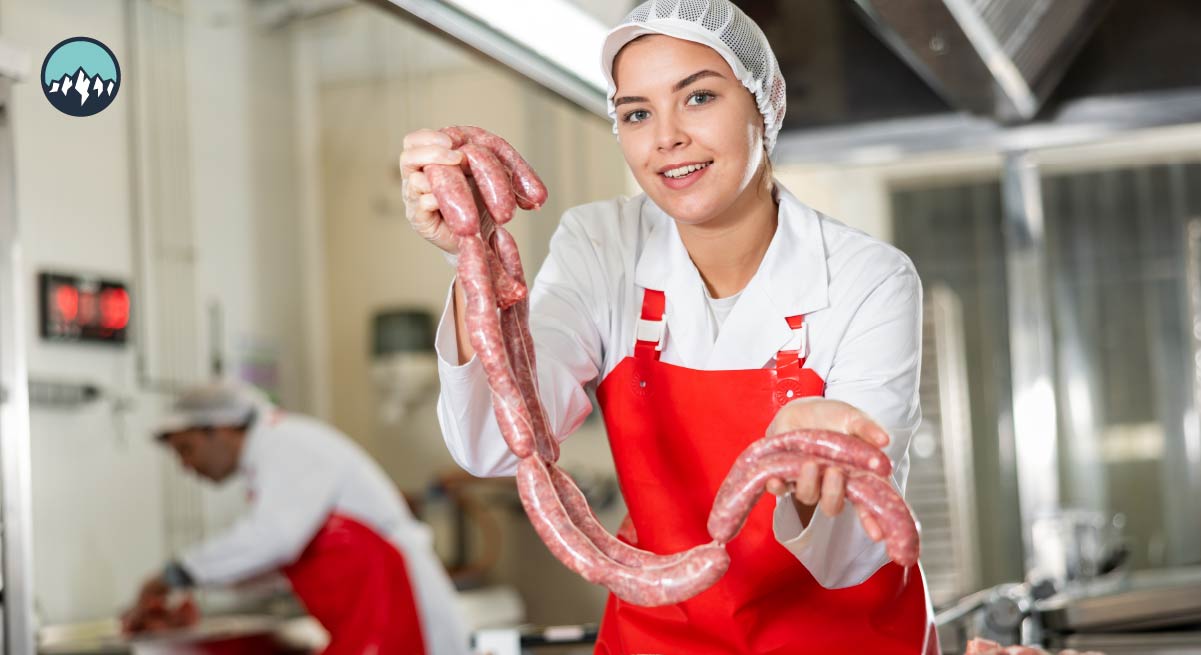Immigrate to Canada as a Butcher
22 Aug 2024

As the second-largest country globally, Canada has a significant demand for skilled workers in various industries, including agriculture and meat processing. Butchers play a crucial role in the Canadian economy, ensuring that quality meat products reach consumers across the nation. For butchers looking to start a new chapter in their lives, Canada provides several pathways to immigrate and establish a successful career.
In this guide, we'll explore how butchers can immigrate to Canada and secure Canadian permanent residency. We'll discuss popular immigration options such as the Express Entry system and the Provincial Nominee Program (PNP) and look into the type of salary you can earn.
Demand for Butchers in Canada

The demand for butchers in Canada is robust and continues to grow, thanks to the country's thriving meat processing industry and strong consumer demand for quality meat products. For those considering a move to Canada, this is great news. The need for skilled butchers is significant and is expected to remain so in the coming years.
According to Job Bank projections, the next ten years will see a total of 5,700 new job openings for butchers, meat cutters, and fishmongers in both retail and wholesale sectors. These openings are due to both expansion demand and replacement demand, as experienced workers retire or move into other roles. This creates a steady stream of opportunities for newcomers to the field.
In addition to job openings, there is a healthy influx of new job seekers expected to enter the Canadian market. Approximately 6,900 new job seekers are anticipated to fill these roles, coming from a mix of school leavers, immigrants, and individuals transitioning from other jobs. This suggests a balanced labor market, where supply closely meets demand, offering stability for both employers and job seekers.
Opportunities Across the Country
The job market for butchers is spread across Canada, but certain provinces show higher demand than others. Provinces like Manitoba, New Brunswick, Ontario, and Saskatchewan have a particularly strong need for skilled butchers in the retail and wholesale sectors. These regions offer promising prospects for those looking to start or continue their careers in meat processing.
Factors Driving Demand
Several factors are driving the demand for butchers in Canada. These include:
- Population Growth: As Canada's population continues to grow, so does the demand for food, including meat products. This increases the need for skilled butchers who can ensure that quality meat is available to consumers.
- Retirement of Experienced Workers: Many experienced butchers are nearing retirement age, creating a need for new workers to replace them. This replacement demand contributes significantly to the overall job openings in the sector.
- Expansion of the Meat Processing Industry: The meat processing industry in Canada is expanding, driven by both domestic and international markets. This expansion requires more skilled workers to meet the growing demand.
- Immigration Policies: Canada’s welcoming immigration policies make it easier for skilled workers, including butchers, to enter the country and contribute to its economy. This helps to balance the supply of workers with the demand.
Pathways For Immigrating to Canada as a Butcher

There are over 80 different immigration programs in Canada, each designed to meet different needs and skills. Whether you're a skilled tradesperson, a professional, or an entrepreneur, there is a pathway for you. The demand for skilled workers, especially in agriculture and meat processing, is high, making Canada an attractive destination for butchers and other tradespeople looking to immigrate.
Express Entry
Express Entry is one of the fastest ways to move to Canada. It manages applications for three main programs: the Federal Skilled Worker Program, the Federal Skilled Trades Program (FSTP), and the Canadian Experience Class. As a butcher, the FSTP is the most relevant.
Express Entry is known for its speedy processing, often taking only six months. Applicants are given points based on age, education, work experience, and language skills. These points are calculated using the Comprehensive Ranking System (CRS). The highest-scoring candidates are invited to apply for permanent residency in Canada through regular draws.
In 2023, Canada made some changes to the Express Entry system to help fill job shortages in important areas like agriculture and agri-food. This means that people with experience in these areas, like butchers and farm supervisors, have a better chance of getting an invitation to apply for Canadian permanent residency. These changes are great news for butchers wanting to work in Canada.
Provincial Nominee Program (PNP)
The Provincial Nominee Program (PNP) is another way to move to Canada. Each province and territory, except Quebec and Nunavut, has its own PNP, allowing them to select immigrants based on their local needs. If you get nominated by a province, you earn extra points in the Express Entry system, which significantly increases your chances of getting an invitation to apply for Canadian permanent residency.
Agri-Food Pilot
Canada’s Agri-Food Immigration Pilot is a special program for people with experience in agriculture and meat processing. To apply, you need a full-time job offer in Canada and must meet other requirements. This pilot program has been extended to 2025, and now more people can apply since there are no longer annual limits on the number of candidates.
Rural and Northern Immigration Pilot
The Rural and Northern Immigration Pilot is aimed at helping smaller communities attract skilled workers. This program is great for butchers who have a job offer in one of the participating communities in Ontario, Manitoba, Saskatchewan, Alberta, and British Columbia. To qualify, you must show that you plan to live in the community and meet certain job, language, and educational requirements.
Participating Communities in the RNIP:
- North Bay, Ontario
- Sudbury, Ontario
- Timmins, Ontario
- Sault Ste. Marie, Ontario
- Thunder Bay, Ontario
- Brandon, Manitoba
- Altona/Rhineland, Manitoba
- Moose Jaw, Saskatchewan
- Claresholm, Alberta
- Vernon, British Columbia
- West Kootenay (Trail, Castlegar, Rossland, Nelson), British Columbia
RNIP Update
On March 6, 2024, Marc Miller, the Minister of Immigration, Refugees, and Citizenship, announced plans to make the Rural and Northern Immigration Pilot (RNIP) permanent. He also introduced new pilots for rural and Francophone communities, starting in fall 2024.
Minister Miller noted the RNIP's success in helping rural areas attract skilled workers and tackle economic and demographic challenges. The goal is to ensure that local businesses can access the skilled workforce they need.
The Rural Community Immigration Pilot will address labor shortages by helping newcomers gain permanent residency, focusing on those who can fill critical roles and settle in these communities long-term.
The Francophone Community Immigration Pilot aims to attract French-speaking immigrants to Francophone minority communities outside Quebec, promoting economic growth and demographic renewal.
These programs highlight Canada's commitment to supporting rural and Francophone communities by providing new opportunities for skilled workers, including butchers.
Atlantic Immigration Pilot
The Atlantic Immigration Program (AIP) is designed to attract skilled workers to Canada’s eastern provinces: Newfoundland and Labrador, Prince Edward Island, New Brunswick, and Nova Scotia. If you’re a butcher looking to settle in any of these regions, the AIP offers a promising pathway to permanent residency. The program is tailored to address specific labor shortages in these provinces by bringing in skilled workers who can contribute to local economies.
To qualify for the AIP, you must have a valid job offer from an employer in one of these provinces. The job offer must be for a full-time, non-seasonal position. Additionally, candidates need to meet language requirements, usually in English or French, and have the necessary educational qualifications and relevant work experience. Settlement funds are also required to ensure you can support yourself and your family when you first arrive in Canada.
Typical Salary as a Butcher in Canada

In Canada, the demand for skilled butchers is reflected in competitive salaries and robust job prospects. According to Talent.com, butchers earn an average salary of approximately 36,368 CAD per year, with entry-level positions starting at around 32,370 CAD annually. Experienced butchers can earn up to 45,260 CAD per year. These figures highlight the lucrative opportunities available to those willing to bring their skills to Canada.
FAQs
Can You Work as a Butcher in Canada While Waiting for Canadian Permanent Residency?
Yes, it's possible to work as a butcher in Canada while your permanent residency application is being processed. To do this, you'll typically need to obtain a temporary work permit. Your eligibility will depend on several factors, including your specific immigration program, job offer, and overall qualifications.
In What Types of Settings do Butchers in Canada Work?
Butcher positions can be found in grocery stores, supermarkets, Fish stores, butcher shops, etc.




